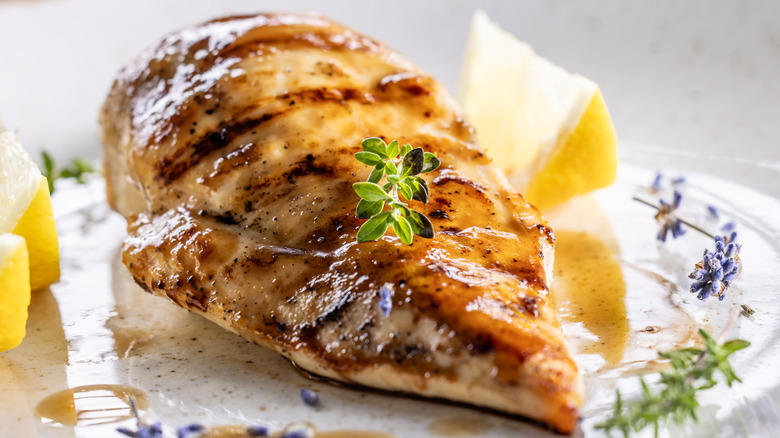If Your Chicken Tastes Fishy, This Might Be The Reason Why
No matter how you season the meat, chicken should taste like chicken. Yet, sometimes you might find the protein has a slightly unusual flavor — dare we say, a faint fishiness. While this may sound odd, it actually isn't an uncommon issue. As a matter of fact, cooked chicken that tastes subtly sea-kissed is becoming increasingly prominent. The question is, why?
The reality is that there could be multiple reasons why cooked chicken tastes slightly like fish. Anything from cross-contamination to spoilage or even something as simple as seasoning the meat with fish sauce or prawn paste could be to blame for off flavors. That said, more often than not, the culprit is chicken itself. By that we mean that altered flavor profiles relate directly to what a chicken is fed. Let us explain.
Typically, commercially-raised chickens consume a diet of corn and soy. These ingredients help to give poultry its signature savory taste. However, in an effort (most likely) to cut down on costs, there's been a shift to feeding poultry a medley of fish meal and fish oil. As a result, research has shown that this causes the meat to take on a fishy funk since the fish meal boasts incredibly high concentrations of unsaturated oil that accumulate in the fowl's fat deposits, impacting fragrance and flavor. Interestingly enough, gustatory changes aren't just present in cooked chicken; a fish-forward diet can also cause eggs to taste different.
When to worry about fishy flavored chicken
Cooked chicken that has a fishy flavor should still be safe to eat. But, if you can't seem to get past its nuanced funk, there are ways to detract from its oceanic flavors. For example, marinating the meat in buttermilk can help mask flavors — it might even neutralize pungency similar to soaking seafood in dairy. Otherwise, pile on the herbs and spices and choose flavorful cooking methods like grilling, to draw attention away from its fishiness. Not sure where to start? Let our recipe for bourbon-chile barbecue chicken drummies inspire you.
Although delicate nuances of fish aren't a major cause for concern, you might still want to take certain steps to reduce these less-than-appetizing flavors. One suggestion is to consider purchasing poultry from local producers. Along with offering greater transparency regarding the diet of their birds, the chickens might even be free-range or pasture-raised. Additionally, be sure to store fresh breasts, thighs, and wings away from fish filets and crustaceans in the fridge so aromas won't leach. What's more, working with well-cleaned tools and refraining from frying with oil previously used to cook seafood doesn't hurt, either.
Bearing all of this in mind, occasionally, fishiness can be a red flag. Should you notice that raw chicken boasts an overwhelmingly foul aroma, this could indicate your chicken has gone bad, especially if accompanied by discoloration or sliminess. In which case, don't bother cooking the chicken. Instead, discard it and head to the market for a fresher bird and, preferably, one with a diet void of fish meal.

